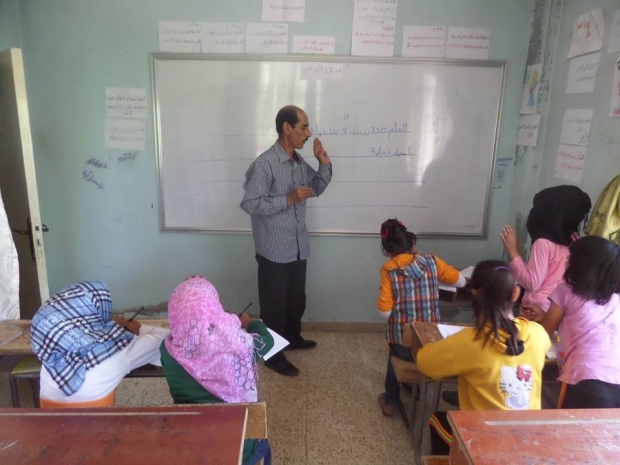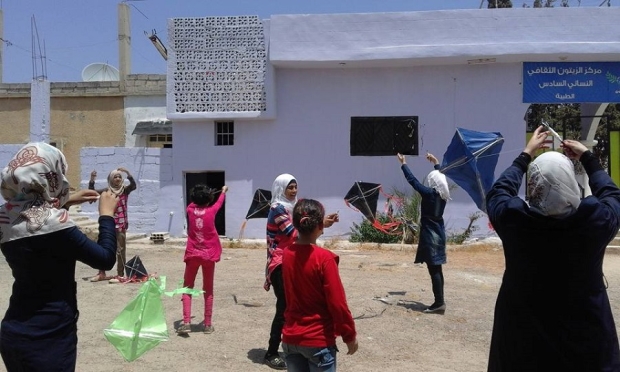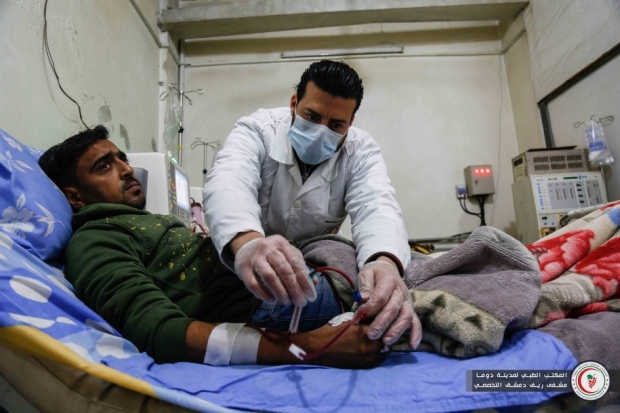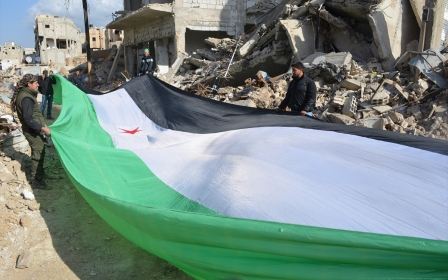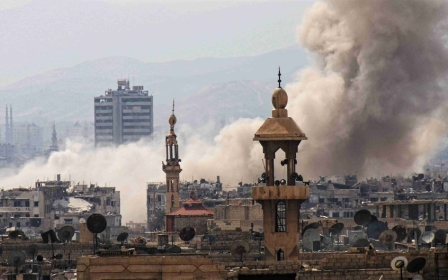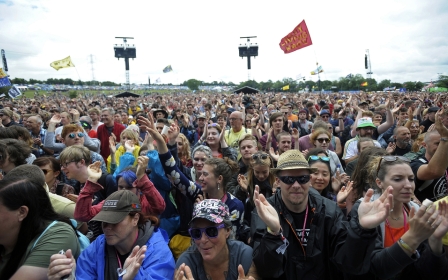Syria's civil society struggles on six years after uprising
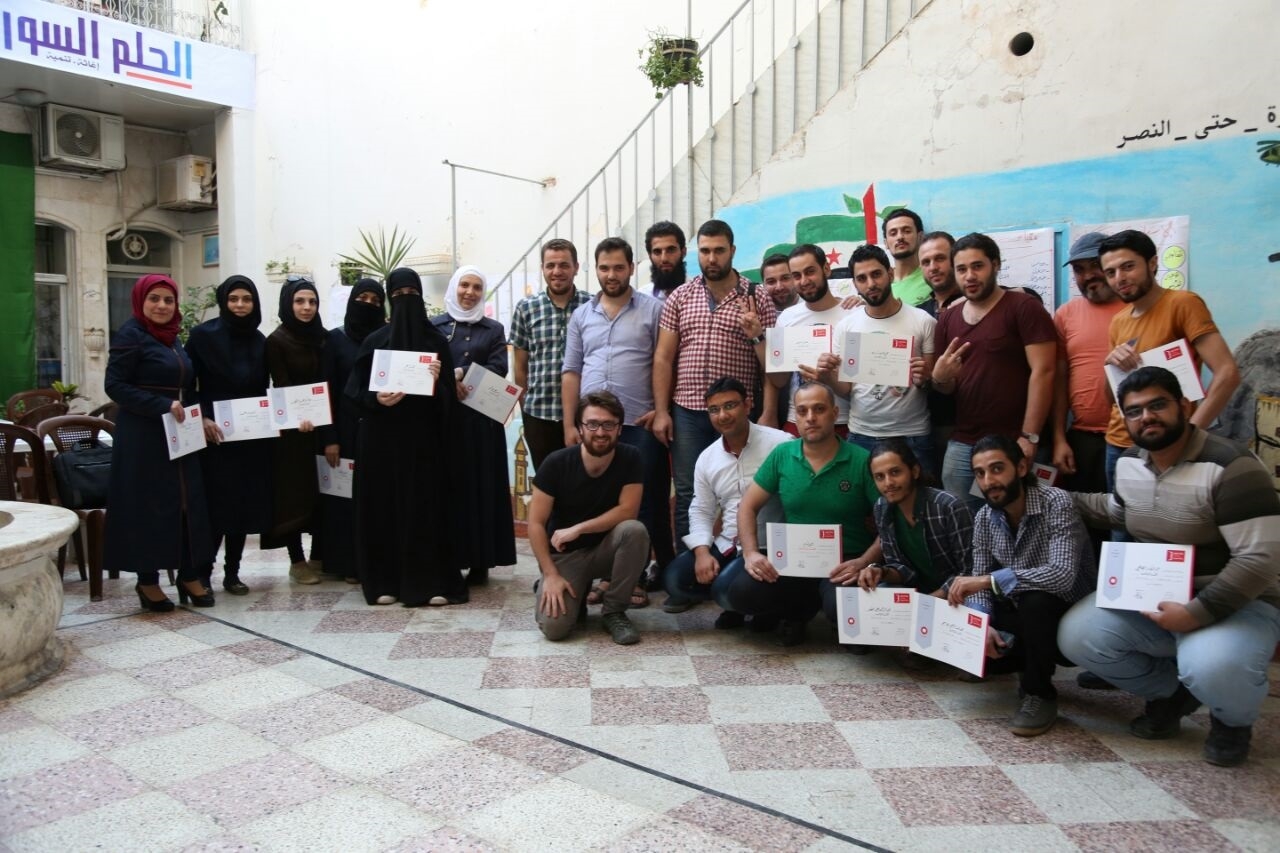
A camera and a cell phone were the only things that Abdel Radman el-Khedr grabbed before leaving his house in Aleppo. Syrian government forces were about to retake east Aleppo and he was one of the last civil activists trapped in the city.
Neither the shelling, nor the bombing, startled him as he stepped outside, because he had become so accustomed to the sounds of war.
“I filmed the destruction,” he told MEE from Azaz, a Syrian city just 32km north of Aleppo. “[Russian and Syrian government] missiles are designed to damage underground shelters. I wanted to show the world who was responsible.”
Khedr is a member of Aleppo’s elected local council, which was designed to compensate for the absence of state services. During much of the siege of Aleppo, he ground wheat and supplied flour to bakeries so that civilians would not starve. To help support Syria's most vulnerable citizens, he also worked at the Life Makers Center, which provided education, psychological guidance and social support to children in east Aleppo.
Despite being nearly killed by a cluster bomb during the east Aleppo onslaught and being unable to get medical attention to shrapnel wounds because many hospitals had been destroyed, Khedr is still clinging to the hope of a better tomorrow.
Khedr now works as a media activist in Azaz while still serving as a member of the local council.
“We are trying to protect people from the consequences of war,” he said. “Most of us have no work and the shelling continues. We need stability," he added.
'We are trying to protect people from the consequences of war'
- Abdel Radman el-Khedr, member of Aleppo's local council
In December, Khedr was one of thousands of civilians forced to evacuate the city that he called home.
The fall of Aleppo struck a major blow to Syrian civil society as most organisations are unable to operate freely in government-controlled areas. Since Bashar al-Assad’s father, Hafez, seized power in 1970, civil society groups have either been prohibited or subject to strict control.
The Syrian uprising nonetheless was a catalyst for the rapid growth of these groups that expanded more in six years of conflict than they did in four decades of Assadist rule. There are now more than 100 civil society groups operating in Aleppo city, but their flexibility is limited. Organisations must be granted approval for every action and none are permitted to defy the government. Interaction with relief groups in opposition-held areas is also not allowed, according to several activists who spoke to MEE.
With government forces and hardline groups now controlling major cities, civil society is struggling for relevance as more activists flee their war-torn country, while other civil society workers have disappeared. The Syrian American Medical Society (SAMS) said that it had lost contact with 70 employees after Assad loyalists gained control over east Aleppo.
“Some [of our employees] fled to regime areas and we still have no news about them,” said Dr Mohammad Katoub, a dentist who used to work in eastern Ghouta and is now the SAMS media and advocacy officer in Turkey.
Democracy and relief
Space of Hope, an organisation that worked in east Aleppo during the siege, was established by a group of students from Aleppo university during the early euphoria of the revolution.
Hiba Brais, a protection coordinator for Space of Hope, said that one of their first initiatives was collecting donations from Syrians living abroad to help residents trapped in Homs city. Additionally, the group supported widowed mothers who lost their husbands in the war.
The Syrian activists that make up the team have since secured funding from several international donors – including Unicef and the German Society for International Cooperation (GIZ) – to run protection centres and schools throughout Syria.
“In 2012, we didn’t know there was any word called ‘civil society’. We were just taking initiative. We didn’t know we had to set up administrations, write proposals and search for donors,” Brais told MEE during a Skype call from her Gaziantep office.
“We were just trying to help people,” she said.
Monther Etaky was working with Space of Hope in east Aleppo until October last year. By that time, the siege was crippling the city, causing him to quit and tend to his family.
“I still cooperated with Space of Hope,” he said. “They were supporting me to open up an underground recording studio [to produce videos documenting human rights violations in Syria]. I opened the doors to the studio during the offensive so that families could hide,” he added.
Etaky and his family were eventually evacuated to Idlib where they stayed for three months. Yet Etaky was reluctant to do any relief work there because of the constant air strikes. Then two weeks ago the situation became stable and he managed to smuggle his family into Turkey.
Idlib is controlled by Hayat Tahrir Al-Sham (HTS), which was formed in January after the militant group Jabhat Fateh al-Sham subsumed several other hardline factions in the city. HTS has routinely tried to impose their own school curriculum and customs, undermining civilian-run councils in the province.
Due to the security issue, Space of Hope is still assessing whether or not they can provide education in Idlib without being forced to subject children to sectarian, political or religious beliefs.
“We don’t promote any ideology or religion in the classroom,” said Brais. “We believe in the revolution, but we cannot force children to share our cause,” he added.
'We don’t promote any ideology or religion in the classroom'
-Hiba Brais, Protection coordinator for Space of Hope
Baytna Syria – Syria Our Home – is another civil society group that consists of an all Syrian staff based in the Turkish city of Gaziantep that finances and monitors projects inside Syria. It was first established in 2013, thanks to support from the Danish government.
The last project Baytna Syria financed in east Aleppo had carried on with their activities until October 2016, just two months before Assad forces gained control of the area. They have now moved their operations to the northern and southern countryside of Aleppo.
“We are also considering projects in Idlib and eastern Ghouta. Our biggest question mark is eastern Ghouta because we’re afraid that the regime could carry out their next major onslaught there," Executive Director of Baytna Syria, Assad al-Achi told MEE.
Eastern Ghouta is one of 39 areas currently under siege – the vast majority enforced by forces and militants supporting Assad. These areas are constantly under bombardment and civil society workers have struggled to keep the population there alive.
Salah al-Ashkar, Baytna Syria's monitoring officer said that most of the projects were designed to provide children with friendly spaces and with educational classes that empowered both women and men.
“We had a project called the Sport Kid where we taught martial arts [to children] and provided them with a football field to play,” said Ashkar, who is now in Gaziantep. “We also funded projects that provided English and computer classes to men, women and children,” he added.
Al-Achi pointed out that Baytna Syria did not have an office in east Aleppo; it was deemed safer for employees to work from their homes to avoid being targeted.
“We are always being careful about where we work, which programmes we support, and for how long,” Achi said over Skype from his office in Gaziantep.
Fleeing Aleppo
Baytna Syria’s Ashkar barely survived the fall of east Aleppo. When he received word that government forces were advancing toward his neighbourhood, he quickly packed a handful of belongings and fled. Hours later, his home was bombed and his neighbours were killed.
'I knew I wouldn’t enjoy the same [degree of] freedom in Idlib as I did in Aleppo. I would have experienced a lot of confrontation and problems with [armed groups]'
- Salah al-Ashkar, Baytna Syria's monitoring officer
According to Ashkar, he was one of thousands of people who slept outside for days until boarding an evacuation bus to Idlib. While there, the idea of working as a photographer for Baytna Syria crossed his mind, as the group already had a monitoring officer in the city. But Ashkar realised it was not the best path for him and instead decided to join his staff in Gaziantep.
“I knew I wouldn’t enjoy the same [degree of] freedom in Idlib as I did in Aleppo. I would have experienced a lot of confrontation and problems with [armed groups] if I tried to work as a journalist,” he said.
An uncertain future
As Assad forces and militants strengthen their grip on Syria, it is clear that the founding ideas of the revolution are in jeopardy.
'Civil society groups work for peace, stability, and a democratic future for Syria. They’re the last defence line for our country to realise these three missions'
- Assad al-Achi, executive director of Baytna Syria
“Civil society groups work for peace, stability, and a democratic future for Syria. They’re the last defence line for our country to realise these three missions,” said Achi.
Whether stability is enough to safeguard civil society is uncertain, in lieu of the Assad forces appearing to be firmly entrenched in power.
Today civilians are just thinking about how to survive, explained Brais. The same can be said about Syrian civil society in their continued struggle against the odds.
“As long as there is one strip of liberated territory, then we won’t stop providing services to our people,” said Brais. “We will support our people until the end.”
New MEE newsletter: Jerusalem Dispatch
Sign up to get the latest insights and analysis on Israel-Palestine, alongside Turkey Unpacked and other MEE newsletters
Middle East Eye delivers independent and unrivalled coverage and analysis of the Middle East, North Africa and beyond. To learn more about republishing this content and the associated fees, please fill out this form. More about MEE can be found here.


